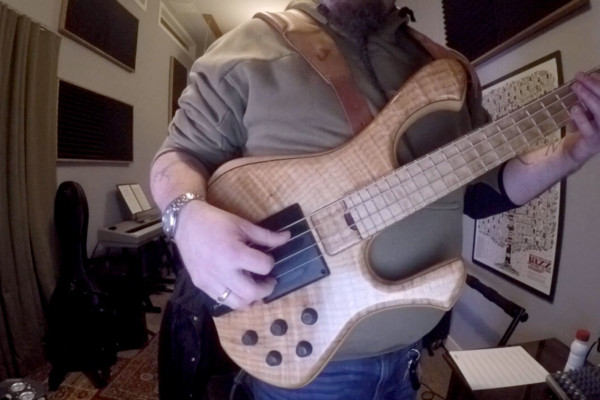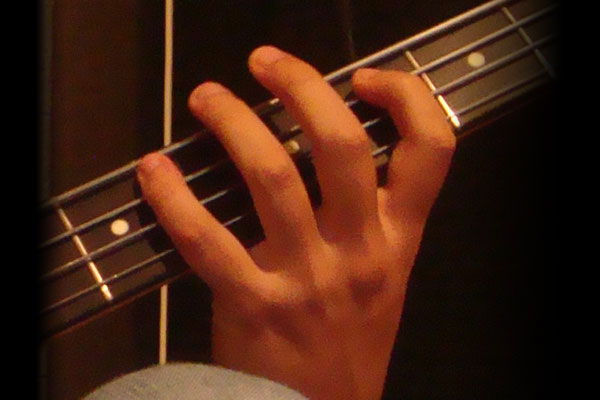Getting Your Students to Practice

Q: I’m a semi-professional bassist who has been taking more students lately. I find that it’s a good way to challenge myself, maybe help somebody along in their path, and it’s a nice way to make a little extra bread. I’ve been struggling lately, though. It seems that most of my students are attentive during the lesson but don’t seem to be doing the work at home. This makes it hard to have any real sense of progress in our lessons, because we can never really move beyond where we were last week (and the week prior, etc.). I’m sure you’ve experienced this. It seems like you likely teach a lot. How do you handle that? Any advice would be greatly appreciated.
A: Yeah, that can be tough. I had a brief stint teaching in a music store and had to bail after just a month or so because it really felt like I was babysitting more than anything. The kid’s folks were dumping them off like an after school program, but the kids didn’t really want to be there. Of course, some of them were stoked to learn how to play a certain song, for example, but had no real drive to do any of the work that would make them good players in their own right.
Personally, I find teaching to be both mentally draining and tiring but also thoroughly fulfilling and energizing when I have someone who makes real progress and has those ‘light-bulb’ moments during the lesson. That’s the reason I teach. I want to be the teacher that gets through to a student and helps them clear the hurdles and walk the path towards proficiency.
I long ago decided that I would not continue to work with people who didn’t do the work after our lessons. It may be selfish but I’m just too busy to waste my time, and there are a million other teachers who would be more than happy to take up the slack.
So, in short, I’m not entirely sure what would take somebody who isn’t driven to practice and turn them around. It takes discipline and some real energy to make those strides on the instrument and, while everyone thinks it would be pretty rad to be able to shred, not everyone has the drive to actually make that happen.
I will say, however, that I’ve had the most success when trying to tailor my lessons towards that person’s specific goals for the instrument. This is the approach I take when teaching at PSU (I’m the electric bass adjunct professor at Portland State) or when teaching jazz workshops. The thing with teaching at a university or an intensive camp is that people are shelling out real money to attend, and typically the students are pretty motivated and ready to work. However, they also all have different goals for themselves and their instruments. When teaching privately, I try to assess what those goals are and then tailor the lessons a bit to lead them in that direction. In other words, if they want to be able to play any gig and do session work, we’ll work on many styles of music, reading notation, theory, fretboard awareness, and anything else that relates. If they just want to get better at jamming with people and coming up with bass lines, we’ll work on learning things by ear, working some ear training and talk about groove development, etc..
Here are a few things that come to mind concerning trying to make someone actually want to practice (or at least, tricking them into doing it):
- Start a practice log together
- Give them a practice regimen and break the time up into sections devoted to specific activities with specific goals in mind (i.e., 20 minutes reading a specific piece of notated music, 20 minutes practice modes, and 20 minutes learning a specific bass line by ear, for example
- Pick music that they want to learn and have them work out tunes by ear and then further help them develop by guiding them about hand position, fingerings, tone, stylistic nuance (slurs, trills, etc.)
- Have them develop lines over changes that you make up
- Keep very specific goals in mind with the student and keep your own notes after each lesson to help you both stay on track and on target
At home, I lose patience when folks don’t do the work and tend to drop them as students pretty quickly (often referring them to another teacher that I think might be better for them). I’m not going to learn a Chili Peppers tune, so I can teach it to them because then I’m doing all of the work and they’re not getting anything out of it but, alas, that’s all some folks want.
There’s also nothing wrong with that, but I know that I’m not the guy to help them and I’m doing both of us a dis-service by taking their cash every week and sending them on their way.
You have to decide what kind of teacher you want to be and what your goals are for yourself and your teaching. Personally, I have a pretty specific method and tend to work with students who want to work with my method. I don’t demand that they are great players before I work with them, but I do demand that they work in between lessons, and show initiative and drive.
Teaching is also very much not my primary focus nor is it my primary source of income. I’ve entertained the idea of teaching in a more ‘full time’ capacity but, while I love the challenge of it, it’s not my passion but rather something that I enjoy specifically because it is difficult, yet highly rewarding when you see the positive results. (kinda like working out, now that I think about it)
I’m actually writing this from a dorm at NDU in Lebanon, where I am teaching at the Lebanon Jazz Workshop for the week. These week long camps are intensive and exhausting, and there’s always a moment when I wonder why I signed up for it… until I start working with the kids. These ‘kids’ are SO stoked to be doing it that, after the camp is done, I 100% commit to coming back next year and get excited to do it. The rewards can be immensely satisfying when your students are passionate and excited to learn and develop.
It sounds like you’re a busy player and teaching is a side thing, so you might consider laying down the law with your students a little bit about work ethic. If the students are young and you have interaction with the parents, there’s nothing wrong with asking them to enforce a bit of a practice schedule. And if they don’t care to do the work? It’s up to you whether you want to trim the fat or cash that check each week. Many students don’t realize that having a great teacher is only a small part of the equation. Many don’t realize that they still have to do the work. That can be a tough wall to break down, and you’re a better man than I if you have the patience and creative teaching chops to do it.
Sometimes it takes a bit of tough love to make someone do the work you know that they need to do. I say that it’s great to be cool and fun to work with, but you also can’t coddle students or let them get away with anything because it just does them harm in the long run. They may decide that music as a career isn’t for them because they just don’t want it bad enough and that’s cool, too. Better that they figure it out sooner than later. I’ve had some hard conversations with students at PSU about what they want in life VS a realistic expectation of what to expect if they didn’t get to work.
I wouldn’t be a fraction of the player I am today if my grandfather hadn’t made me practice every single day, for at least an hour. He would also get reports from my teachers every lesson, asking if I had done the work and made any progress. And, yes… he’d let me know if I wasn’t carrying my weight.
It used to drive me insane, and I’d get angry, etc.. He always told me that I’d thank him one day and damned if I didn’t later in life. It took a while but, I now thank him every time I pick up my instrument.
Have a question for Damian Erskine? Send it to [email protected]. Check out Damian’s instructional books, Right Hand Drive and The Improviser’s Path.



